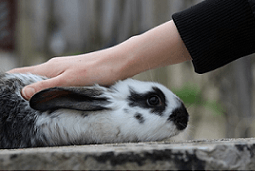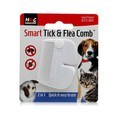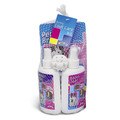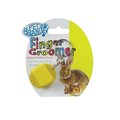With the approach of autumn, it's an important time of year to start thinking about your small pet's grooming. We are slowly but surely approaching that dreaded time of year when wind, rain and mud arrives by the bucket load. The lawn is waterlogged and muddied, and strong winds drive leaves and other debris across the garden. For small animals that are housed outside, autumn and winter brings a host of problems, including soggy coats and dirty paws. The need for regular grooming is never more important than now.
Although most rabbits and guinea pigs will meticulously self-clean whatever the season, sometimes they need a helping hand to stay in top condition. If the weather is particularly bad and your pet’s coat is matted with mud and faecal matter from sitting on a soggy lawn all day, it is important to towel dry your animal and gently groom the mud away. The more regularly you do this, the easier it will be to maintain the coat and the less stressful your pet will find it.

Depending on your small animals’ lifestyle and coat length, the amount of grooming will vary. Long-haired rabbits and guinea pigs will benefit from a quick daily groom to keep their coat tangle-free and glossy. Either use a stiff, small brush for this or a metal comb. Sometimes it will be necessary to trim the coat if it’s dragging on the ground and collecting mud.
Some small pets are notorious diggers and their claws will also need attention. Wipe these clean if they are particularly dirty and cut any claws that are overgrown. Be careful doing this as you don’t want to accidentally nip the quick and cause bleeding.
If your rabbit has a tendency to roll or spread out on the ground, pay particular notice to its coat when the weather turns to avoid mud-spattering and coat tangling. While guinea pigs can be bathed, they find this incredibly stressful, so reserve it for only when truly necessary. Likewise, rabbits are dry-groomers that don't need bathing. However, if you must bathe your pet on your vet's advice, bring it inside to keep it as warm as possible.
A mild, pet-friendly shampoo should be used, being careful to avoid the delicate eye and ear areas, and thoroughly rinsed off before your guinea pig is towel-dried. Small animals are easily chilled and can succumb to pneumonia quite quickly if they are left damp after bathing. Even after towelling, put your guinea somewhere warm to properly dry-off. Sometimes vets recommend bathing to help treat a parasite problem, but more often than not it is the only way to soak off hard, caked-on mud and dried urine.
Unlike rabbits and guinea pigs that are usually housed outside and need regular grooming, hamsters and other caged indoor animals need less. That said, long-coated Syrian hamsters will benefit from the occasional groom with a soft brush (or toothbrush) to remove debris and loose hair from the coat. Chinchillas are also self-groomers and will roll around in dust to maintain the condition of the coat. A chinchilla bath should be provided throughout the week, more so in summer, and regularly changed if soiled in.Aside from maintaining the appearance of your small animal, regular grooming also gives you the chance to bond with your pet and build its confidence in being handled.
As prey animals, rabbits and guinea pigs rarely show signs of injury or illness, so grooming provides the perfect opportunity to examine your pet and look for knots, cuts, sores, fleas, dental disease and overgrown teeth, and problems with the claws. The more regularly you groom, the sooner you will notice problems, which can then be treated.
If you have any advice on small animal grooming, please share it with our other readers!
Written by: Aaron








